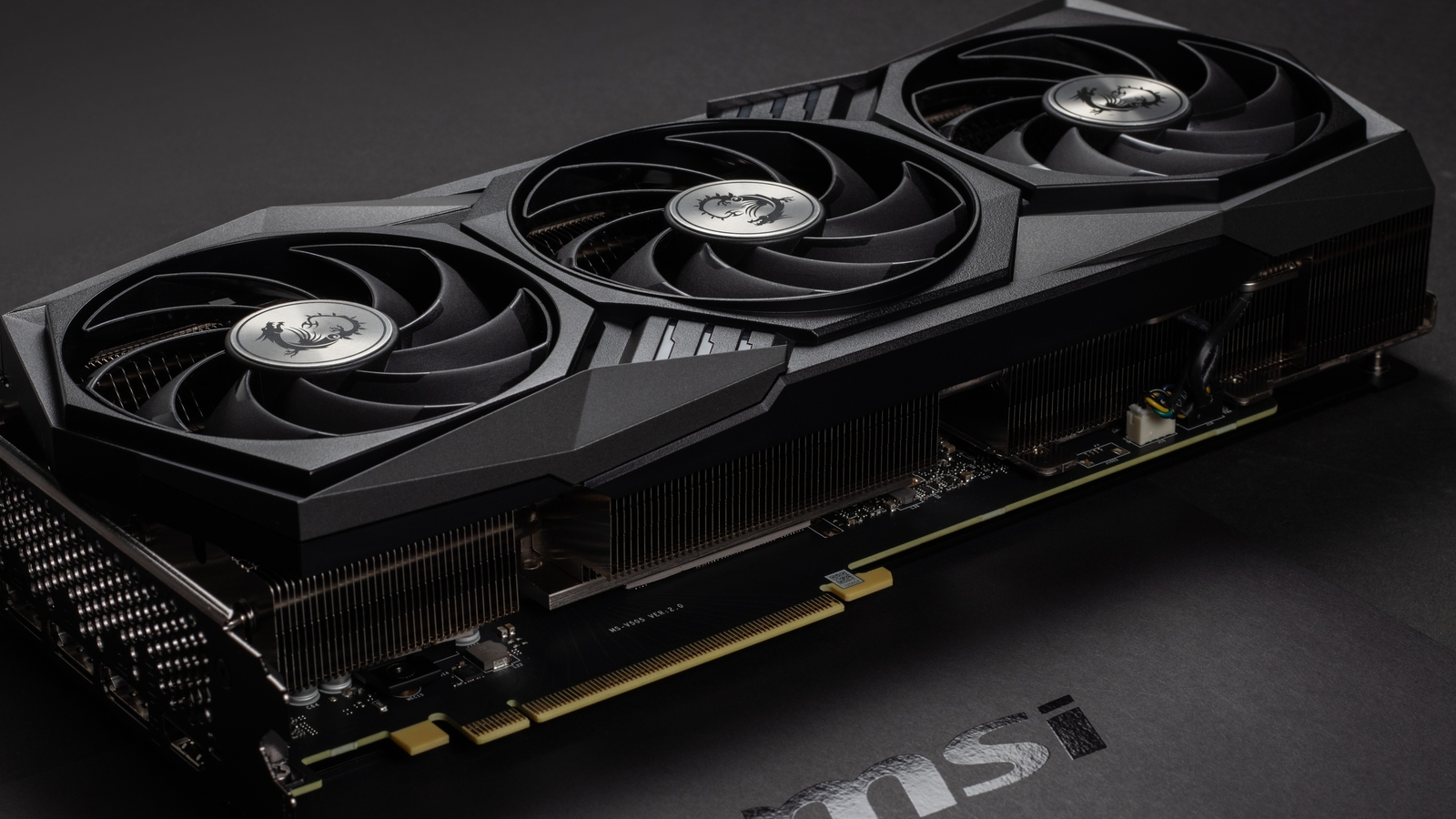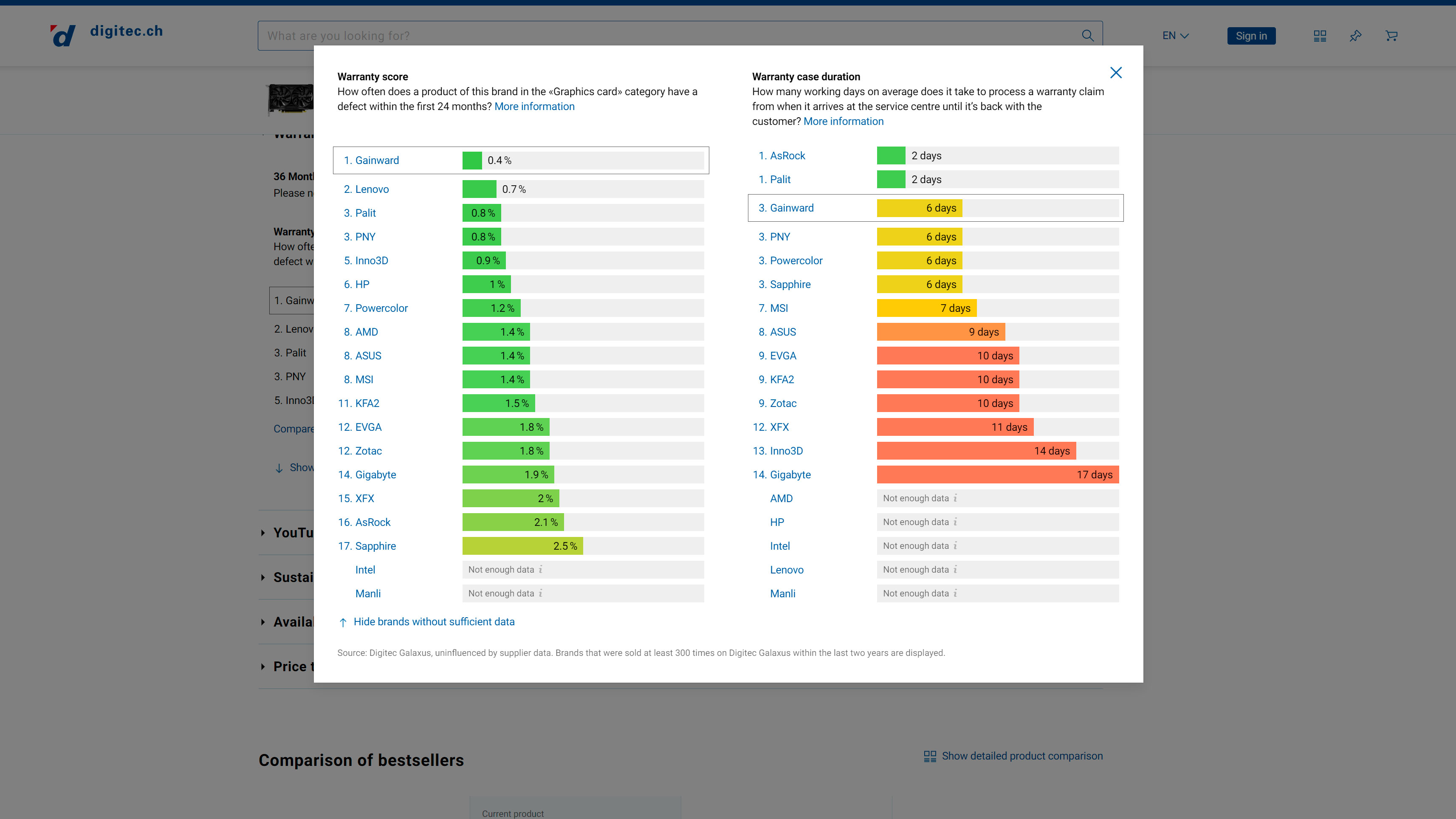Swiss Retailer Stats Reveal Which GPU Brand Has the Highest Failure Rates

Even the best graphics cards can fail sometimes. Digitec Galaxus AG (via TechEpiphany), one of the largest Swiss online IT providers, openly shares its statistics on which graphics card vendor has the highest failure rates and the time it takes to process a warranty claim.
It's important to remember that the collected data is limited to Digitec Galaxus AG's sales. Therefore, the data does not portray the number of cases globally. For obvious reasons, Digitec Galaxus AG doesn't fully divulge the total amount of units sold. Sadly, that also means we don't have the whole panorama for the charts. For example, a lower value of failure rates doesn't necessarily mean the brand is better than the competition if it only represents a small portion of the global sales. According to Digitec Galaxus AG, the compiled information corresponds to brands that have sold at least 300 units over the last two years. The company also didn't specify whether the data is based solely on gaming graphics cards or also included professional graphics cards.
The charts reveal that Gainward has the lowest number of defective graphics cards, with a 0.4% RMA rate. Gainward, which has belonged to Palit since 2005, is largely unknown outside the European market. Meanwhile, Palit is in third place on the chart with 0.8%.
Companies such as Lenovo and HP rank second and sixth place. They don't sell graphics cards individually. However, they are prebuilt system vendors that sometimes make their own graphics cards or leverage units from other brands. That's probably why Digitec Galaxus AG included Lenovo and HP charts. Furthermore, the Swiss store sells some standalone Lenovo- and HP-branded graphics cards, but they're mainly professional SKUs.
The statistics show that AMD graphics cards are in eighth place with a failure rate of 1.4%. Since AMD doesn't make graphics cards, Digitec Galaxus AG is likely referring to the reference models, now more commonly known as MBA (Made By AMD). PC Partner, who also makes products for Sapphire, Dell, or Samsung, is the vendor that manufactures AMD reference graphics cards. Curiously, Zotac, a PC Partner subsidiary, has a 1.8% failure rate.
PowerColor is seemingly the best AMD partner, with a defective rate of 1.2%. Sapphire has the most significant RMA rates, with a 2.5% share, out of the three AMD-exclusive AIB partners. XFX was close behind with 2%.
Inno3D (0.9%) appears to be the best Nvidia partner. Of course, the company has a strong presence in Europe but is little known in the U.S. market. Meanwhile, EVGA, which no longer makes graphics cards, sits in 12th place with a 1.8% RMA rate. Regarding the other big-name brands, Asus and MSI are tied at the eighth position with 1.4% defective rates, while Gigabyte (1.9%) and ASRock (2.1%) are at 14th and 16th, respectively.
Get Tom's Hardware's best news and in-depth reviews, straight to your inbox.
Digitec Galaxus AG also recorded the manufacturer warranty case duration, considering when the graphics card gets to the service center until it returns to the customer. In this aspect, Gigabyte is the worst vendor regarding RMA times, as it takes 17 working days to complete the RMA process. Meanwhile, ASRock and Palit RMA service is top-notch, requiring two working days.

Zhiye Liu is a news editor, memory reviewer, and SSD tester at Tom’s Hardware. Although he loves everything that’s hardware, he has a soft spot for CPUs, GPUs, and RAM.
-
pf100 Reply
It could have an effect on a buying decision I make.Dr3ams said:Those are useless statistics to the general consumer. -
ilukey77 Ive got alot of powercolor GPU's and never once had issue with any of them if they ever did Nvidia cards i would buy theirs..Reply
funny i would have though sapphire would have been better as they are the OG AMD AIB card provider !! -
deesider Reply
Useful to reinforce my bias against GigabyteDr3ams said:Those are useless statistics to the general consumer. -
Dr3ams Reply
I own two Sapphire cards and not a single problem. Sapphire cards here in Germany are highly rated and if you look at online buyer reviews, at retailers such as Alternate and Mind Factory, you'll see around 99% positive comments.ilukey77 said:funny i would have though sapphire would have been better as they are the OG AMD AIB card provider !! -
Dr3ams Reply
If you are buying from that retailer, then maybe their statistic would be useful. But their statistic doesn't match buyer reviews here in Germany and it probably wouldn't match reviews in the United States either. Also, some retailers don't even test the cards before they RMA them back to the manufacturer.pf100 said:It could have an effect on a buying decision I make. -
USAFRet Reply
The percentage differences are so small as to be irrelevant.pf100 said:It could have an effect on a buying decision I make. -
sstanic People who buy expensive Asus Strix cards are far more likely to send them back if they don't like the pink shade of their RGB compared to people who buy the cheapest Gainward or Palit cards..Reply -
cyrusfox Matches my experience with Gigabyte, takes forever to RMA, but they did fix my card, took about 6 weeks with acceptance, shipping and fix turnaround. Not quick....Reply -
bond007alex Wow, how convenient, the top spots are all taken by companies with little availability to the plebs or companies that sell gpu's that don't have to be installed.Reply
I wonder why that could be? Is that because people with little tech knowledge are far more likely to destroy tech with improper handling?
Without controlling the samples this entire study isn't very useful.
